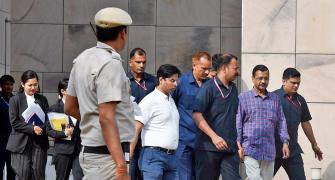There is a great deal of silliness in India that passes off as politics, so there's no reason why Punjab shouldn't have its quota of it. Earlier it was only the Akali Dal-led Punjab government that was spending valuable government time and legal resources in trying to decide how to punish the chief of the Haryana-based Dera Sacha Sauda sect, Gurmit Ram Rahim Singh. Now it is the Haryana Government as well.
On Wednesday night, the Punjab government asked the Punjab police to carry out a court order to arrest the Dera chief. As he lives in Haryana, the task has fallen to the Haryana police. A Congress government is in power in that state and it has provided armed police protection to the Dera. Clearly it will either have to arrest Singh or appeal against the order. This is the factual story so far.
The name of the Dera chief - Gurmit Ram Rahim Singh - itself should have triggered off an alarm on some silliness index somewhere, but it now represents a serious law and order problem. At its heart is just one question: who controls government - religious orders or elected representatives?
A dera is a single person setting up a religious institution for social or educational activities. There are thousands of deras, big and small, all over north India, headed by Sikh or Hindu chiefs - the Radhasoami Satsang Beas is one such; the Nirankaris have their own deras.
The logic is that since the Akal Takht, the highest Sikh religious body, cannot be present everywhere to translate the tenets of Sikhism on the ground, anyone who wants to can set up a dera to preach and practice a religion that technically does not recognise caste.
The Dera Sacha Sauda is one such. It is located in what is now Haryana but was once undivided Punjab. It has a largely Dalit following in Sirsa which is a Sikh belt contiguous with Punjab. Gurmit Ram Rahim Singh is a successor of previous highly popular gurus, and has a reputation of being a somewhat quixotic individual who lives in an air-conditioned cave, is fond of dressing in king-like robes, drives luxury cars and keeps armed guards with him at all times.
All political leaders - Prakash Singh Badal, Amrinder Singh and S S Dhindsa - have called on him to seek his blessings at one time or another.
Gurmit R R Singh would have been just another harmless religious leader had it not been for two events - one, a CBI enquiry into the circumstances of the murder of a journalist who wrote reports charging Singh with various misdeeds including murder and rape; and two, that Singh, one day in the middle of the campaign for the just concluded Assembly elections, announced to his followers that they all must vote for the Congress.
Alarmed at this, BJP leader Arun Jaitley went to Singh to tell him he was making a mistake by dabbling in politics. The general perception was that Singh had done a deal with the Congress to get the CBI off his back.
When the Congress did, in fact, virtually sweep the Sangrur, Bathinda and Mansa belt (once an Akali stronghold), and it became clear that the Akali Dal had lost at least 10 to 15 seats in the 117-member Punjab assembly because of Singh's fiat, it was determined to take revenge.
Incidentally, Singh's son-in-law Harminder (referred to reverentially by Sauda followers as 'Sahibzaada') won the Bathinda assembly seat.
Now, Singh thought he was a giant killer. Wasn't he the one who had kept the Congress honour in the face of a wave that had threatened to wipe the party off the face of the Assembly? However, he made a mistake that all big leaders make at some time in their career - he overreached himself.
During a congregation in April, he conducted an amrit sanchar ceremony, mimicking the historic ritual of Guru Gobind Singh that involved anointing the panj piaras (five apostles) with his blood. The only difference was Guru Gobind Singh had five and this guru appointed seven.
This made the Akal Takht furious. Pictures of the event showing the Sikh religious symbol ik onkar at Singh's feet appeared everywhere. All the towns on the Haryana-Punjab border erupted in a fury. The Akal Takht called for a social boycott of the Dera and demanded an apology in seven days.
Swami Agnivesh and others met Singh and mediated but at the end of it, what emerged was "a press release" and not an apology, the Sikhs said. The Takht neither accepted nor rejected the apology but meanwhile, got supporters to file a case charging the Dera chief for hurting their religious sentiments.
With amazing speed, the lower courts passed an order in favour of the complainants and asked Punjab police to arrest Gurmit R R Singh.
What happens now? The Sikhs are up in arms. A huge sangat is scheduled to be held in Haryana on July 11 to force the B S Hooda government to take action. The Sikhs are now divided between the anti-Congress and pro-Congress factions.
As the apology was supposedly mediated, among others, by Paramjit Singh Sarna, a Congress sympathiser whose supporters won the Delhi Shiromani Gurudwara Prabandhak Committee elections, the Congress is being perceived by hardliners in the Akal Takht as 'the betrayer of religion'.
Not unnaturally, the Akali Dal is milking this for all it can. After all, the law and order problem has now been exported to Haryana, hasn't it?
Though the Dera Sacha Sauda episode is unlikely to leave a lasting mark on Punjab or Haryana politics, it does illustrate how easily religion can manipulate politics. But the question - whether in Punjab, religious leaders control government or elected representatives - still begs an answer.








